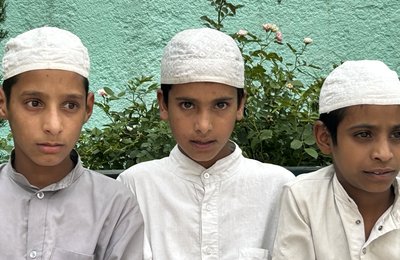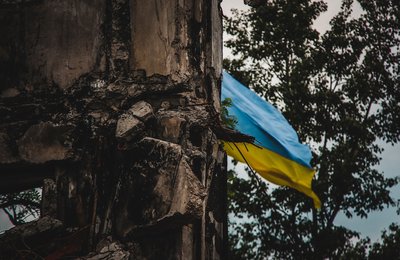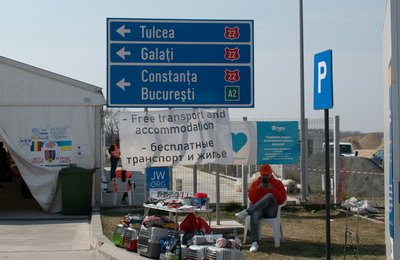"A war on exhaustion": peacebuilders mark 2 years of war in Ukraine
February 24 marks the second anniversary of Russia’s brutal full-scale invasion of Ukraine. Twenty-four months since Russia invaded Ukraine and created 1,500 km long active front line, forcing entire communities to be dependent on humanitarian assistance coming from local civil-society organizations, volunteers and international organisations.

2023 began with high hopes for Ukrainians, as the army was planning a counteroffensive against Russia. But then the war turned into a positioning war, with no significant progress for either side. In parallel, the future of Western support for Ukraine’s war efforts was brought into question and this raised concerns about the humanitarian aid that contributes to peacebuilding activities. The West’s support gradually crumbled, fractured by political divisions and internal political processes, and eroded by war fatigue and corruption scandals in Ukraine. The West was also distracted by other demands, such as China’s menacing of Taiwan and the Israel - Palestine crisis.
Yet, the needs of Ukrainians have not reduced. Throughout 2023, the situation in the country has become even more extreme. Cities in five Ukrainian regions, including Crimea, Donbas and the South are still occupied. In total, according to the Commander-in-Chief of the Armed Forces in Ukraine, 109,000 km2 and 1,877 Ukrainian cities are still under Russia’s occupation. Since the start of the war, at least 10,000 civilians have been killed and over 147,000 houses have been destroyed, amounting to $55.9 billion.
Over 14.6 million people living in Ukraine – about 40 per cent of the population – are in need of humanitarian assistance. More than 4 million people are still internally displaced across Ukraine and 3.3 million live in active conflict areas. The humanitarian needs are still high, but the funding for humanitarian activities is decreasing.
Continuing efforts of local peacebuilders
On the 11th year of the war in Donbas and the third year of full-fledged war in Ukraine, volunteers and local civil society organisations continue to risk their lives to help war-affected people across the war zones and the occupied territories, delivering assistance and bringing hope to people across the country. I spoke with local peacebuilders from Ukrainian Volunteer Center, Charisma On and Proliska to discuss their peacebuilding response activities, the key priorities and reflections on the second year of the war.
Throughout the war, the priorities of local peacebuilders scaled up and were shaped by the needs of affected Ukrainians. In 2022, this came in the form of humanitarian aid, psychosocial support and gathering resources.
In 2023, some organisations like Proliska increased their presence across the country and scaled up their activities to cover more affected people. Emergency response continues even two years in, with peacebuilders still evacuating people from dangerous areas; providing food, hygiene and medicines; helping to restore damaged houses with temporary solutions; finding shelters; and providing psychological and legal services.
Many local CSOs and volunteers have become first responders for victims of shelling, working without days off to react quickly after shelling. This causes a huge fatigue among staff and volunteers.
Eugen Kaplin, director of Proliska, says “Now it is a war on exhaustion, local peacebuilders think how to support people during this hard time through humanitarian aid, reconciliation, mediation, psychosocial support. Everyone on this level continue to support the communities building peace.” That is what local peacebuilders can do at the moment as they cannot stop Russia from bombing Ukrainian cities and killing civilians.
Some local CSOs like Ukrainian Volunteer Service have re-focused on supporting smaller civil society organisations to engage more volunteers and organise work in small local communities.
Olena Vuzka head of national programs at Ukrainian Volunteer Centre, says, “we are used to international help, but we should remember that each of us can take part in supporting Ukraine to bring peace by, for example, by donating or even by cutting potatoes for borsch to dry and send to the militaries in the war zone, among others.”
Many peacebuilders are also providing psychosocial support to Ukrainians, as the demand remains high. According to the estimation of the Ministry of Health of Ukraine, around 40-50% of Ukrainians need psychosocial support.
When the chaos lessened in 2023, Charisma On from Dnipro (centre-east of Ukraine), was one of many organisations that returned to more traditional peacebuilding work.
Charisma On began with activities focused on peace and reconciliation. These included developing mediation skills between local and displaced people in communities, building inclusive spaces, particularly for those with disabilities, and career counselling for Internally Displaced People (IDP) to help them acquire new job skills to empower people and create economic opportunities. As a result, last year many IDPs already started working and integrating with the local communities.
Irma Niniashvili, head of Charisma On, said, “we are motivated by the heroic stories of guys in the frontline. That does not allow me to give up. Also, I start every morning with a donation. Already 2 years of war flew away unnoticed.”
Shrinking funding
However, 2023 saw a change to funding for local peacebuilders. They were affected by numerous challenges, including budget cuts by donors, while some newer peacebuilding organisations lack experience in preparing donor proposals and bureaucracy. Overall, funding significantly decreased in 2023. The need is high across all of Ukraine but donors primarily give funding for peacebuilding activities mostly for the front-line areas, so CSOs have been forced to focus only on the East and South of Ukraine.
According to Humanitarian Response Plan-2024, in 2024 CSOs with financial support of donors will continue prioritising strengthening communities’ resilience and carrying out community-based protection interventions. These include conflict resolution activities, aimed at addressing emerging tensions and disputes among different war-affected population groups over access to public services, the provision of financial resources, labour markets and humanitarian assistance, and promoting better integration of internally displaced people in areas of displacement and of returnees upon return.
Conclusion
After 2 years of full-fledged war, Ukrainians, peacebuilders, volunteers and donors are exhausted. It is made worse by the reduction in funding, the corruption scandals in Ukraine and challenges to conduct the Presidential elections in Ukraine in 2024.
Continuous support from Western partners is critical in 2024. As the war in Ukraine is protracting, it is likely that their focus will be further disturbed with other wars and conflicts as well as internal political processes in the countries, such as the US Presidential elections.
Local peacebuilders and volunteers are still motivated to support affected Ukrainians despite the tiredness, sleepless nights. They continue helping affected Ukrainians non-stop, donating to the army’s and people’s needs in order to bring Ukraine closer to the victory.







